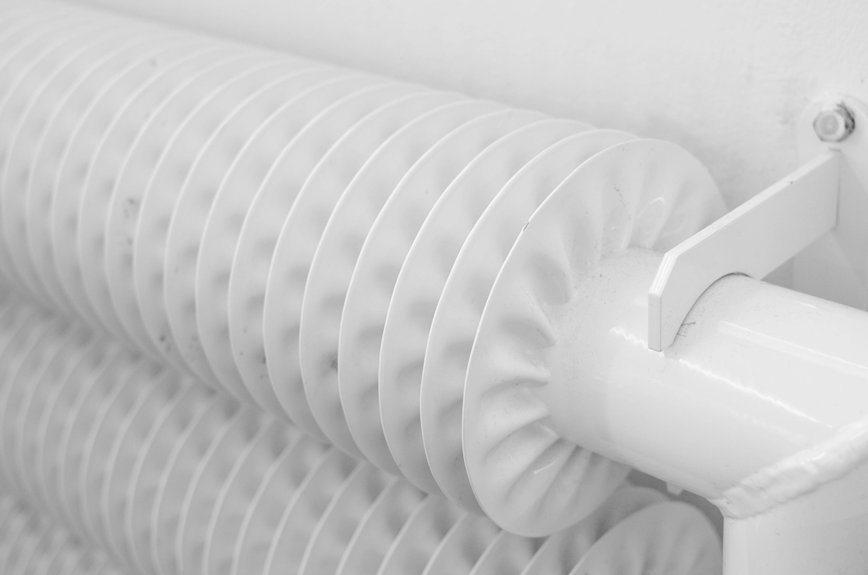A heating unit is a system that provides warmth in buildings and comes in various types such as hydronic boilers, electric heaters, or heat pumps. Commercial units, including VRF systems and rooftop units, are designed for larger spaces, while residential options focus on smaller, quieter operation.
Factors such as the size and layout of the building, along with budget considerations, play a crucial role in determining the most suitable choice. Understanding these options is essential to ensure efficient and comfortable heating.
The right heating system can significantly enhance the living or working environment, making it important to consider individual needs and preferences when selecting the best solution.
Types of Commercial Heating Units
There are several types of commercial heating units used to maintain comfort and energy efficiency in large buildings. Variable Refrigerant Flow (VRF) and VRV systems are esteemed for their precise control, enabling different zones to be heated or cooled simultaneously or independently. Modern VRF systems also incorporate advanced controls and sensors, enhancing overall efficiency and user comfort. Rooftop Units (RTUs) are self-contained systems installed on roofs, combining heating, cooling, and ventilation in a single unit. These are particularly suitable for retail and office spaces. Boilers produce hot water or steam, providing consistent heating in colder climates, making them ideal for larger buildings such as schools and hospitals. Split systems cater to smaller areas, with individual units for compact spaces and multi-split systems for larger zones, offering considerable flexibility. Water-source and geothermal heat pumps present energy-efficient alternatives, transferring heat through water loops and earth-coupled systems, thus supporting year-round temperature regulation.
Features and Benefits of Different Heating Systems
Different heating systems offer a variety of features and benefits that cater to diverse building requirements and climates in the UK.
Hydronic systems are known for their high efficiency, as water retains heat better than air. This results in even and consistent warmth without the noise often associated with other systems. Additionally, hydronic systems enhance air quality since they don’t circulate dust or allergens, contributing to a healthier living environment. Water’s heat retention also enables hydronic systems to operate effectively even at lower temperatures, further increasing their energy efficiency.
Nonetheless, the installation costs can be significant due to the need for a boiler and complex piping.
Electric baseboard heaters provide a more affordable installation option and heat up rooms rapidly, making them ideal for smaller spaces or occasional use. They’re also relatively easy to maintain; however, they may lead to increased energy bills as they consume electricity directly.
Heat pumps offer effective, year-round comfort by transferring heat rather than generating it, making them a sustainable choice for eco-conscious households. Their versatility allows them to provide both heating and cooling, adapting to the changing seasons while maintaining energy efficiency.
Each heating system has its own unique advantages, and the best choice often depends on individual requirements, budget, and the specific characteristics of the property.
Comparing Commercial and Residential Heating Solutions
Commercial systems are engineered to heat and cool expansive spaces such as shopping centres, offices, and warehouses. These systems often have substantial capacities and are designed to be modular and scalable, allowing for future expansion. They utilise advanced components, including multi-stage compressors and extensive ductwork, which facilitate flexible zoning and control. Because of their large scale, they often require more complex control systems to manage the diverse zones efficiently. In contrast, residential units are smaller and designed specifically for individual homes. They typically feature simpler equipment, such as piston or scroll compressors, and generally serve the entire household through split systems. These systems are commonly installed on the ground or in basements for easy access and maintenance. Moreover, commercial installations are frequently located on rooftops or away from high-traffic areas, prioritising space efficiency. Residential units, however, are focused on providing quiet operation and are usually positioned at ground level for enhanced comfort and convenience. Understanding the distinctions between these two types of heating solutions is essential for selecting the right system for specific needs, ensuring optimal performance and energy efficiency.
Factors Influencing Heating Unit Selection
Selecting the appropriate heating unit is influenced by several crucial factors, with the size and layout of the building being paramount. Larger spaces generally require more powerful or sophisticated systems to ensure efficient heating. Proper system sizing is essential for maintaining optimal comfort and energy efficiency. Additionally, the layout of the building, including factors such as ceiling height and room arrangement, significantly affects the suitability of various heating solutions. It is also essential to consider scalability, particularly if the space may expand or undergo changes in use. Implementing zone control allows for the management of varying temperature requirements across different areas, while the choice between centralised and decentralised systems is often dictated by available space and the building’s structural characteristics. Local climate conditions and temperature preferences play a vital role in the selection process, as outdoor cold levels and indoor comfort must be balanced. Budgetary considerations, encompassing installation, maintenance, and ongoing energy costs, are equally important to ensure a practical and sustainable heating solution.
Conclusion
Selecting the appropriate commercial heating unit is essential and should be based on various factors, including the size of the building, energy efficiency, and budget considerations. Different systems, such as boilers and heat pumps, provide distinct advantages tailored to specific requirements.
While commercial heating solutions are typically more robust than their residential counterparts, careful evaluation is vital in achieving optimal performance and cost savings.
Understanding these crucial elements enables businesses to choose a system that delivers reliable and efficient heating, specifically designed to meet their unique needs.

